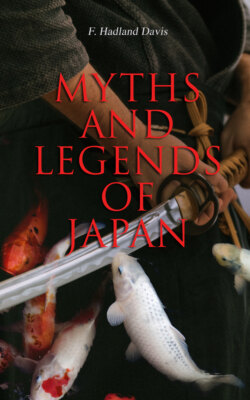Читать книгу Myths & Legends of Japan - F. Hadland Davis - Страница 30
На сайте Литреса книга снята с продажи.
"My Lord Bag of Rice"
ОглавлениеOne day the great Hidesato came to a bridge that spanned the beautiful Lake Biwa. He was about to cross it when he noticed a great serpent-dragon fast asleep obstructing his progress. Hidesato, without a moment's hesitation, climbed over the monster and proceeded on his way.
He had not gone far when he heard some one calling to him. He looked back and saw that in the place of the dragon a man stood bowing to him with much ceremony. He was a strange-looking fellow with a dragon-shaped crown resting upon his red hair.
"I am the Dragon King of Lake Biwa," explained the red-haired man. "A moment ago I took the form of a horrible monster in the hope of finding a mortal who would not be afraid of me. You, my lord, showed no fear, and I rejoice exceedingly. A great centipede comes down from yonder mountain, enters my palace, and destroys my children and grandchildren. One by one they have become food for this dread creature, and I fear soon that unless something can be done to slay this centipede I myself shall become a victim. I have waited long for a brave mortal. All men who have hitherto seen me in my dragon-shape have run away. You are a brave man, and I beg that you will kill my bitter enemy."
Hidesato, who always welcomed an adventure, the more so when it was a perilous one, readily consented to see what he could do for the Dragon King.
When Hidesato reached the Dragon King's palace he found it to be a very magnificent building indeed, scarcely less beautiful than the Sea King's palace itself. He was feasted with crystallised lotus leaves and flowers, and ate the delicacies spread before him with choice ebony chopsticks. While he feasted ten little goldfish danced, and just behind the goldfish ten carp made sweet music on the koto and samisen. Hidesato was just thinking how excellently he had been entertained, and how particularly good was the wine, when they all heard an awful noise like a dozen thunderclaps roaring together.
Hidesato and the Dragon King hastily rose and ran to the balcony. They saw that Mount Mikami was scarcely recognisable, for it was covered from top to bottom with the great coils of the centipede. In its head glowed two balls of fire, and its hundred feet were like a long winding chain of lanterns.
Hidesato fitted an arrow to his bowstring and pulled it back with all his might. The arrow sped forth into the night and struck the centipede in the middle of the head, but glanced off immediately without inflicting any wound. Again Hidesato sent an arrow whirling into the air, and again it struck the monster and fell harmlessly to the ground. Hidesato had only one arrow left. Suddenly remembering the magical effect of human saliva, he put the remaining arrow-head into his mouth for a moment, and then hastily adjusted it to his bow and took careful aim.
The last arrow struck its mark and pierced the centipede's brain. The creature stopped moving; the light in its eyes and legs darkened and then went out, and Lake Biwa, with its palace beneath, was shrouded in awful darkness. Thunder rolled, lightning flashed, and it seemed for the moment that the Dragon King's palace would topple to the ground.
The next day, however, all sign of storm had vanished. The sky was clear. The sun shone brightly. In the sparkling blue lake lay the body of the great centipede.
Hidesato and the Centipede.
The Dragon King and those about him were overjoyed when they knew that their dread enemy had been destroyed. Hidesato was again feasted, even more royally than before. When he finally departed he did so with a retinue of fishes suddenly converted into men. The Dragon King bestowed upon our hero five precious gifts—two bells, a bag of rice, a roll of silk, and a cooking-pot.
The Dragon King accompanied Hidesato as far as the bridge, and then he reluctantly allowed the hero and the procession of servants carrying the presents to proceed on their way.
When Hidesato reached his home the Dragon King's servants put down the presents and suddenly disappeared.
The presents were no ordinary gifts. The rice-bag was inexhaustible, there was no end to the roll of silk, and the cooking-pot would cook without fire of any kind. Only the bells were without magical properties, and these were presented to a temple in the vicinity. Hidesato grew rich, and his fame spread far and wide. People now no longer called him Hidesato, but Tawara Toda, or "My Lord Bag of Rice."
1. This version appears in the Catalogue of Japanese and Chinese Paintings in the British Museum, by Dr. William Anderson.
